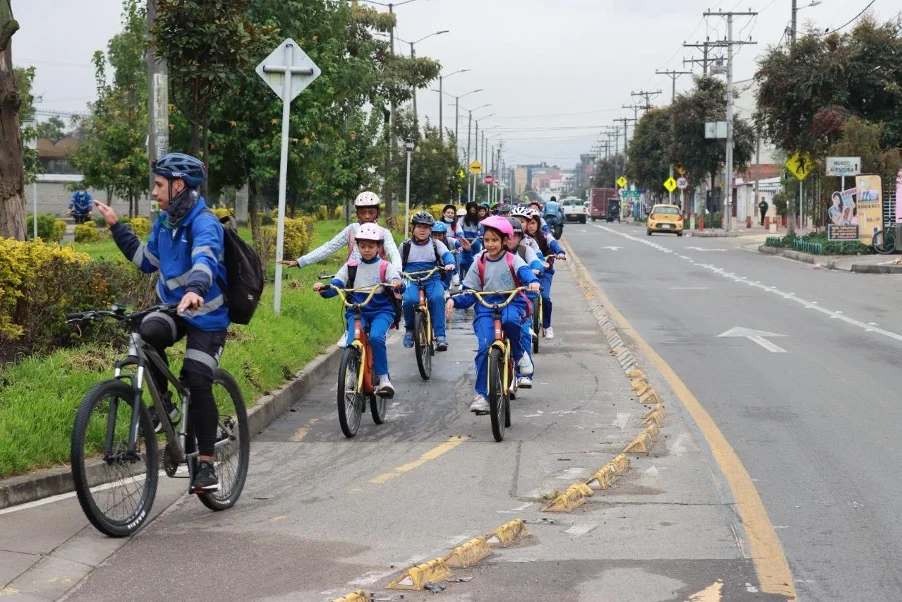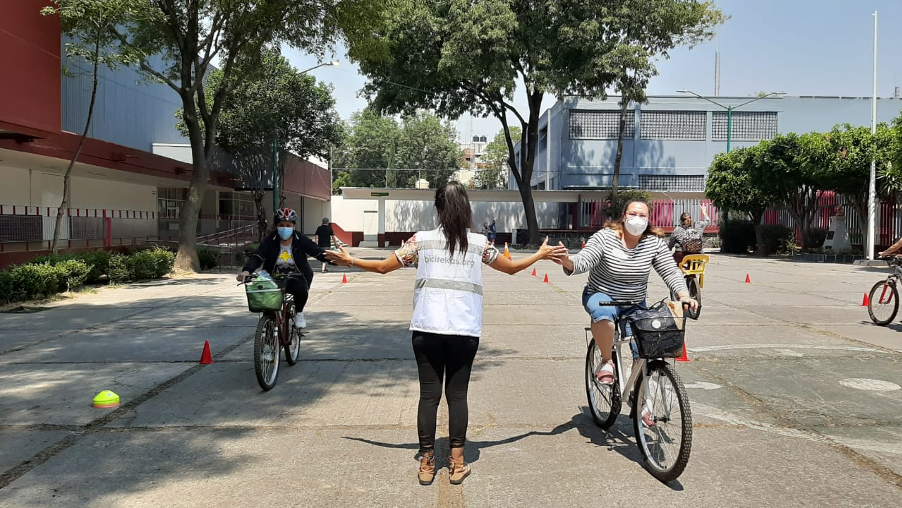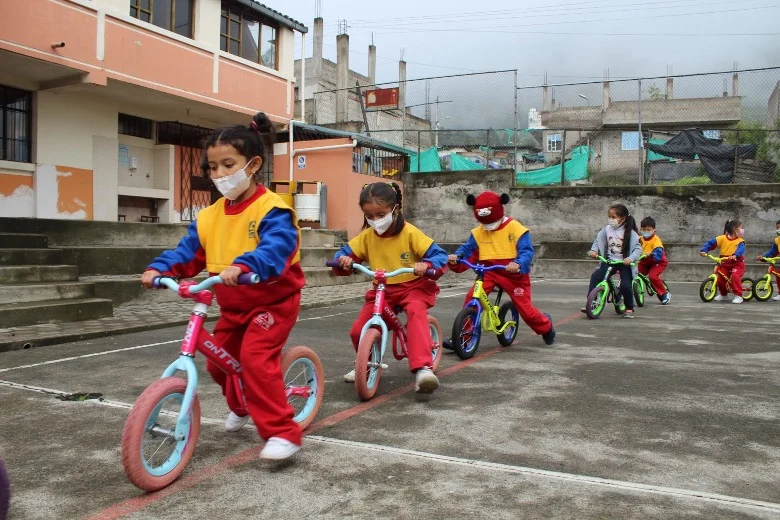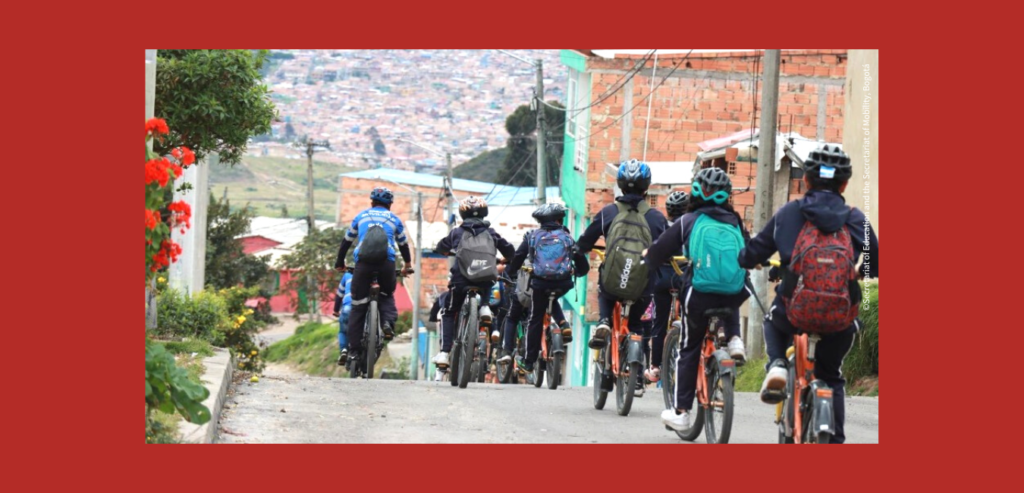Author: Lucas Snaije
Cycling supports climate-friendly cities and the well-being of children and families in many ways, from improving air quality and health to increasing road safety. In the run-up to COP27, Lucas Snaije of BYCS, an Amsterdam-based global NGO supporting community-led urban change through cycling, discusses how programmes to support uptake in Latin America offer strong evidence for action.
Building on the last-minute inclusion of active and public transportation in the COP26 transport declaration, sustainable urban mobility will receive greater consideration at COP27 in Egypt. To enable just transitions, we must place users with the greatest needs – such as women, young children and low-income populations – at the centre of mobility discussions so they can reap the social, environmental and health benefits of active travel.
To create and support uptake of inclusive cycling cultures for children and their caregivers, we need two things: a dramatic increase in dedicated infrastructure that will work alongside behavioural change programmes. Examples from Latin America show promise and can offer learnings for cities around the world.
Cycling makes cities cleaner, healthier and safer
Every day, around 93% of the world’s children under the age of 15 breathe air that is so polluted it puts their health and development at serious risk. A mobility shift that prioritises cycling over cars can reduce air pollution and associated health risks for children. Research from the Oxford Transport Unit found lifecycle CO₂ emissions drop by 14% per additional cycling trip and by 62% for each avoided car trip.
Now, a new study from the Institute for Transportation and Development Policy (ITDP) demonstrates how networks of protected bicycle lanes are a cost-effective way to decarbonise transport. Compared to building expensive metro rail systems (a key part of sustainable urban transportation) protected bicycle lane networks reduce emissions 10 times more for every dollar spent.
Cycling also has multiple health benefits. Cycling daily helps meet World Health Organization (WHO) recommendations for daily physical activity, reduces the risk of obesity and improves overall fitness. In addition, it supports mental health and well-being, especially for young children and adolescents.
A recent study by BYCS shows that cycling supports cognitive development in young children and improves child–caregiver relationships, while being a useful, reliable, efficient mobility choice for households. Being on a bicycle as a young child offers important sensory experiences, stimulating senses of touch, smell, sight and hearing. It also engages a child’s sense of movement, balance and spatial awareness, all of which are key in a child’s early years.
Cycling also makes streets safer. Road crashes remain the single biggest killer and injury burden to young people aged 15 to 25. A recent report cites the use of traffic regulation strategies – such as rerouting vehicles away from kindergartens and reclaiming streets for car-free mixed-use public spaces – as one of the most important interventions to reduce emissions, protect children and encourage walking and cycling.

Children biking to school with a ‘bicycle bus’ in Bogotá, Colombia © Secretariat of Education and the Secretariat of Mobility, Bogotá
Cycling programmes for children in schools and public spaces
Programmes that can support children to cycle help them learn how to cycle safely, gain access to bicycles, and develop an affinity for active travel. The Al Colegio en Bici (Biking to School) programme in Bogotá, Colombia is an example of such a successful behaviour-changing programme. This initiative promotes cycling as a healthy and environmentally friendly way for children to travel to school.
It also aims to improve school access and attendance rates of low-income children through the loan of bicycles. From 2013 to 2019, more than 15,000 low-income children have benefited from safe routes to school and cycle expeditions. To achieve this, daily ‘bicycle buses’ are organised to and from schools and meeting points close to home. The programme also holds cycle expeditions around the city where children and adolescents have the opportunity to reappropriate public space and enjoy the cultural offerings of the city, while learning how to cycle safely, developing the cycling habit and positive associations with cycling at a young age, which is key to continue cycling as adults.
The Cycling Games project in Quito, Ecuador and the Deja tus Rueditas (Leave Your Wheels) programme in Buenos Aires, Argentina are two programmes that promote cycling for young children. These initiatives take place in schools and public spaces such as parks or plazas and successfully engage young children on the benefits of cycling while improving their skills early on with balance bikes and tricycles.

A Mamas Pedaleando sin Miedo workshop (Mamas Pedaling Without Fear) in Mexico City © Bicitekas
Cycling programmes that support caregiver mobility
Cycling can be an empowering tool for caregivers and promote gender-fair cities. Many low-income caregivers rely on walking and public transport, making multiple stops at off-peak times in neighbourhoods often located along loud, congested and polluted arterials. This means they bear a higher environmental burden to access jobs and basic amenities. Given the right conditions, the bicycle can be a healthy, flexible, energy-efficient and low-cost mode of mobility for caregivers.
Mexico City and Bogota are two cities that support caregivers to cycle. In Mexico City, the NGO Bicitekas has organised workshops called Mamas Pedaleando Sin Miedo (Mothers Pedalling Without Fear). Its members and local cycle-school instructors taught a group of mothers the skills to cycle with their children around the city. This included testing different cycles and equipment suited for care-trips, assessing and improving cycling skills, and giving practical tips for safely navigating traffic with children. Bicitekas also supports community bicycle sharing through its Bicicatarinas programme, to empower mothers in low-income areas access job opportunities.
Bogotá’s new bikeshare system is also an example of good practice when thinking of care journeys and cycling. The system has 300 stations and 3,300 bicycles, including 150 cargo bicycles, 150 adaptive cycles, and 150 bicycles that have seats for transporting children. Most bikeshare systems are not set up to enable or encourage this kind of use, whether due to explicit age restrictions, lack of appropriately sized bikes or accessories, or general logistical constraints. Bogotá’s system can set a standard for more inclusive cycling promotion, as well as infrastructure and service delivery.

Cycle Games programme in Quito © Amanda Padilla
Cycling is a way to achieve more liveable cities
Cities can be liveable for children and their caregivers if their daily mobility needs are better understood and prioritised in plans and programmes. There is emerging knowledge to support the development of child-and-caregiver-sensitive mobility infrastructure. In addition to the programmes mentioned, experimental temporary approaches such as open streets, that started in Bogotá in the 1970s, or school streets and play streets, will be key to shifting the transport paradigm towards active and child-and-family-friendly travel.
It is important to remember that the drastic changes in urban form and culture that occurred in the Netherlands in the 1970s, prioritising people over cars, burgeoned from a protest movement seeking to protect the rights of children, coupled with the right political will. Advocacy movements in Latin America are among the strongest in the world, and emerging leadership across the continent could pave the way for a cycling-friendly urban future that is healthier, sustainable and family oriented.
About the Author
Lucas Snaije manages research and advocacy initiatives for BYCS. Lucas has previously worked in both academic and non-profit sectors in Los Angeles and Montreal, focusing on urban governance and transportation futures. Lucas holds a BA in anthropology of development and a Msc in human geography.
The Ideas4Action series aims to inspire with ideas that have worked in other cities and countries so that you too, can take action in your own city. Read more of our blogs here.
This work is licensed under a Creative Commons Attribution-NonCommercial-NoDerivatives 4.0 International License. When re-sharing this content please ensure accreditation by adding the following sentence: ‘This blog was first published by the Global Alliance – Cities4Children (www.cities4children.org/blog)’

